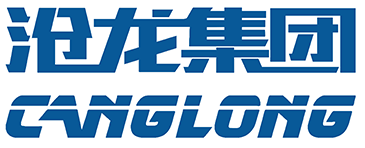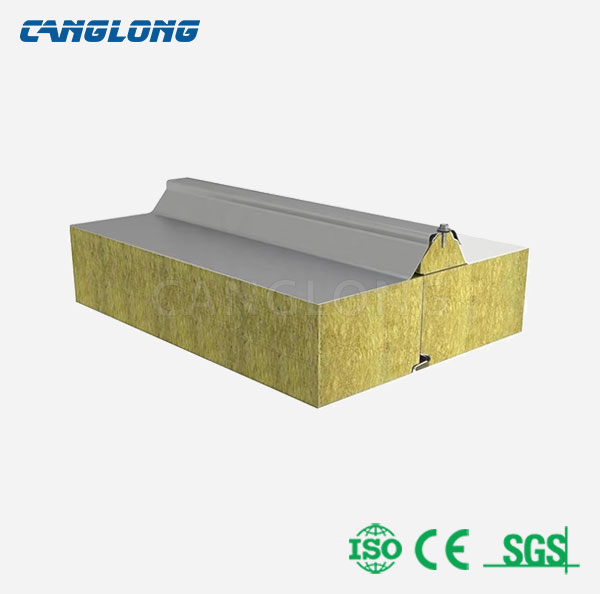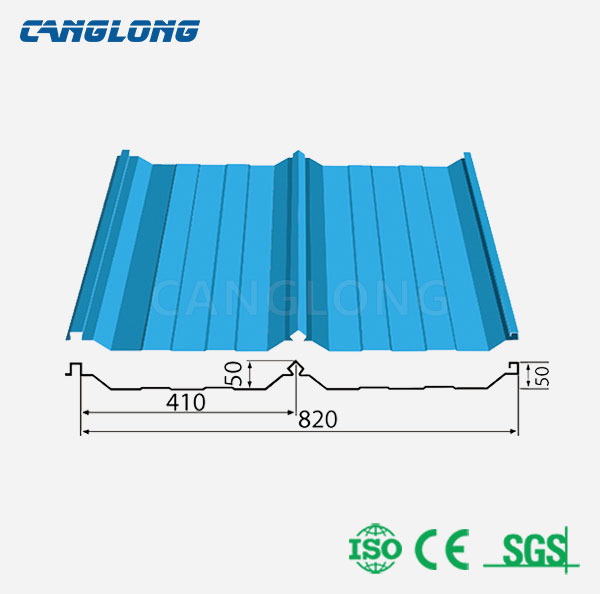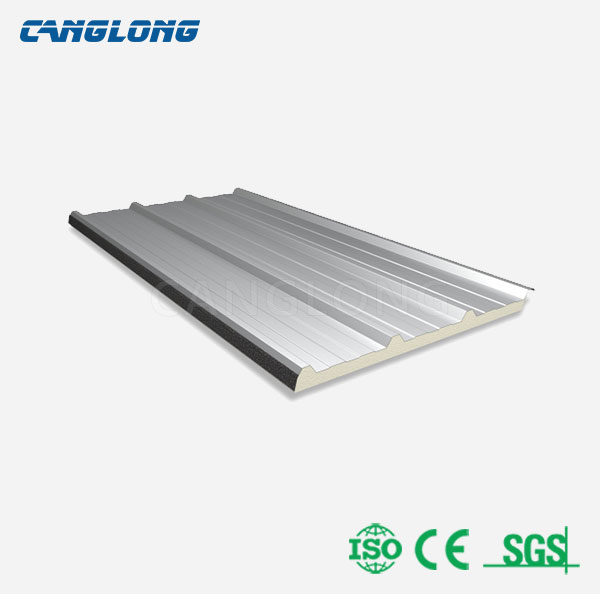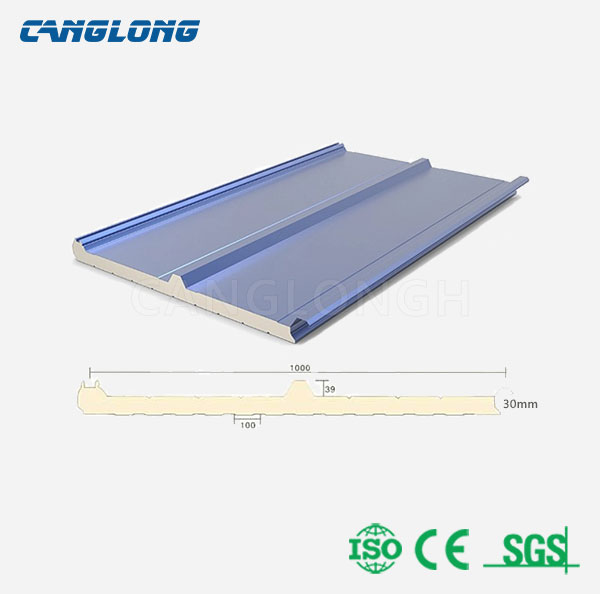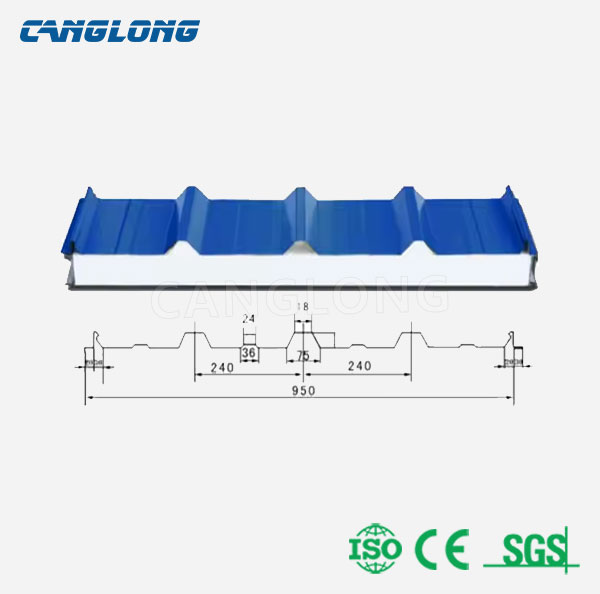
75mm Polystyrene Roof Panel
- Effective Width: 950mm
- Metal Sheet Thickness: 0.2mm to 0.8mm
- Coating and Plating: PE/HDP/PVDF/SMF/Hot-galvanize/Aluminium/Stainless
- Color of Steel Plate: White/Offwhite/Blue or Customized
- Core Material: Polystyrene (EPS)
- Core Thickness: 75mm
- Delivery Time: 7-15 days
- Shipping Port: Qingdao Port
- Payment: T/T, L/C, PayPal
- Service Life: ≥15 years
- Product Origin: Henan, China
Product Details
75mm thickness polystyrene roof panel is a popular choice for various construction applications, particularly in commercial, industrial, and residential buildings. These panels are designed to provide excellent insulation, durability, and ease of installation.
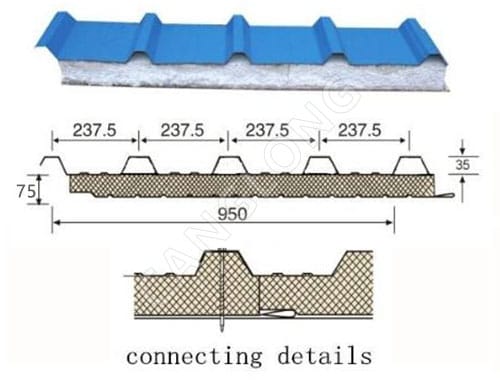
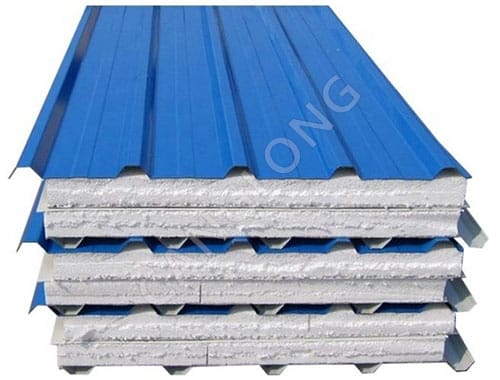
Features of polystyrene roof panel
- Insulation Performance: The 75mm thickness of polystyrene (EPS) provides outstanding thermal insulation, helping to maintain comfortable indoor temperatures and reduce energy costs.
- Lightweight Design: Polystyrene roof panels are lightweight, making them easy to handle and install without the need for heavy lifting equipment.
- Durability: Polystyrene sandwich roof panels are resistant to moisture and pests, ensuring a long lifespan with minimal maintenance.
- Pre-formed Panels: These roof panels are typically pre-manufactured, allowing for quick and easy installation on-site, which can significantly reduce construction time.
- Versatile Applications: Suitable for various roofing styles, including flat, sloped, or pitched roofs, making them adaptable to different architectural designs.
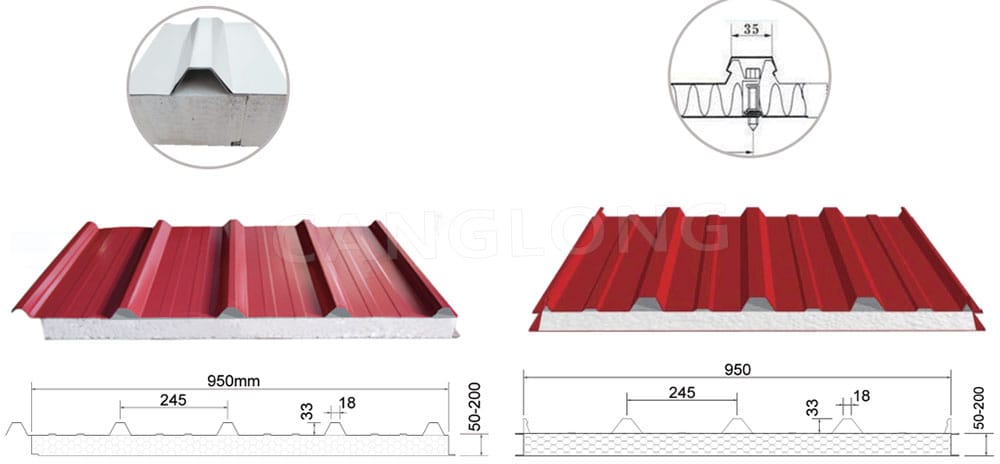
Polystyrene Sandwich Roof Panel – Span Table
| Thickness (mm) | Single span(mm) | Multi-span(mm) | ||||||||||||
| 1500 | 2700 | 3900 | 5100 | 6300 | 7500 | 8700 | 1500 | 2700 | 3900 | 5100 | 6300 | 7500 | 8700 | |
| 50 | 5.16 | 2.35 | 1.28 | – | – | – | – | 4.15 | 2.07 | 1.17 | – | – | – | – |
| 75 | 7.70 | 3.74 | 2.00 | 1.21 | – | – | – | 5.9 | 2.91 | 1.72 | 1.11 | – | – | – |
| 100 | 9.41 | 4.63 | 2.55 | 1.53 | 1.04 | 0.76 | – | 7.61 | 4 | 2.41 | 1.58 | 1.1 | – | – |
| 125 | 10.98 | 5.55 | 3.11 | 1.86 | 1.25 | 0.92 | – | 7.74 | 4.25 | 2.95 | 1.98 | 1.4 | 1.03 | – |
| 150 | 13.26 | 6.78 | 3.67 | 2.19 | 1.47 | 1.07 | 0.82 | 7.74 | 4.35 | 3.04 | 2.35 | 1.77 | 1.31 | – |
Advantages of polystyrene roof panel
- Energy Efficiency: The excellent thermal insulation properties of polystyrene roof panel help reduce heating and cooling costs, making buildings more energy-efficient.
- Cost-Effectiveness: While the initial investment may vary, the long-term savings on energy bills and reduced maintenance costs contribute to overall cost-effectiveness.
- Fire Resistance: Polystyrene panels can be treated with fire-retardant materials, enhancing their fire safety performance in compliance with building regulations.
- Sound Insulation: The density of the polystyrene material also provides good sound insulation, contributing to a quieter indoor environment.
- Sustainability: Many polystyrene sandwich panels are made from recyclable materials, aligning with sustainable building practices.
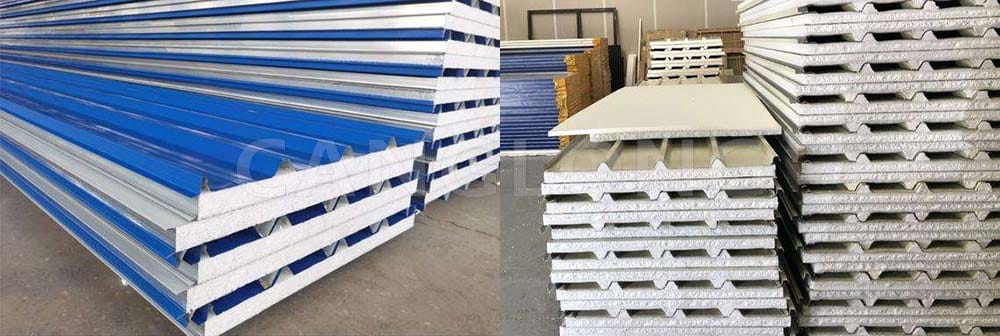
Considerations
- Local Building Codes: Before installation, it is essential to understand local building codes and regulations that may affect the use of eps panels, particularly concerning fire safety and insulation requirements.
- Waterproofing: Proper waterproofing measures should be taken during installation to prevent moisture ingress, which can lead to insulation degradation.
- Support Structure: Ensure that the underlying support structure is adequately designed to handle the load of the panels and any additional roofing materials.
- Temperature Sensitivity: Polystyrene can be sensitive to extreme temperatures, so it is crucial to consider the climate in which the panels will be used.
- Maintenance: While polystyrene panels require minimal maintenance, regular inspections should be conducted to check for any signs of wear or damage.

Conclusion
75mm polystyrene roof panels offer a practical and efficient solution for modern roofing needs, providing excellent insulation, durability, and cost savings. Their lightweight design and ease of installation make them an attractive option for construction projects across various sectors. By considering local regulations and proper installation practices, builders can leverage the benefits of polystyrene panels to create energy-efficient and sustainable buildings. As the demand for environmentally friendly construction solutions continues to rise, 75mm polystyrene roof panel is likely to remain a popular choice in the industry.
Sandwich Panel Production Workshop

Sandwich Panel Packing & Shipping
All the products are loaded at the loading site of our factory using crane and forklift by our skilled workers, who will prevent the goods to be damaged. And all the structure components, panels, bolts and sorts of accessories will be well packed with standard package and it is suitable for ocean transport.
Inspection: 50% inline inspection and 100% full final inspection, make sure all output w/o any mistake.
Packing: Per customer's requirements or per product sizes, full protection packing.
Shipping: Per customer's requirements or per container sizes.
Unloading: We package it as a whole and can be easily pulled out at once with a forklift, which is very convenient.

Our Certificates
Our sandwich panel certificates include EU CE certification, BPS certification, and ICC certification.

Application of Sandwich Panels
Usage scenario: Insulated sandwich panels are used as exterior walls and interior partitions, installed vertically or horizontally on single span or multi span structures. Such as industrial buildings, steel frame structures, warehouses and logistics centers, commercial buildings and offices, fire-resistant buildings, agricultural and livestock buildings, sports halls, exhibition halls, factories, garages, hangars, barns, prefabricated houses, cold storage, clean room, etc.

We provide the following RAL color card colors for your reference. For other colors, please compare the Raul color card colors.
Note: The above color card has a slight deviation due to printing reasons, please refer to the actual products.


If you purchase metal sandwich panels from Canglong Group, we will also provide some accessory products, including self tapping nails, rivets, waterproof caps, polyurethane glass glue, mouth and corner accessories, outer ridge tiles, waterproof eaves, external and internal corners, eaves edging, plugs, door and window edging, purified aluminum profiles, etc.




High-quality Raw Materials
We strictly select high-quality suppliers. All color steel coils and core materials are from China top 500 companies and have undergone strict quality inspections to ensure the basic quality of the products.
-

Advanced Production Equipment
The factory is equipped with advanced production equipment, including automated production lines, cNc cutting machines and high-precision pressing equipment, to ensure that the production process of each color steel sandwich panel is accurate and stable.
-

Mature Supply Solutions
One-stop supply of all accessories for sandwich panel installation, standardized packaging process, to avoid friction or damage of sandwich panels on the road, easy for customers to unload, saving time and money for customers.
-

Q1: What are the main applications of polyurethane sandwich panels?
A: Polyurethane sandwich panels are commonly used for insulation and construction in various building types, including residential, commercial, industrial, and agricultural structures. They are suitable for walls, roofs, ceilings, and floors.
Q2: What are the advantages of polyurethane sandwich panels?
A: Polyurethane sandwich panels offer excellent thermal insulation properties, lightweight construction, high strength-to-weight ratio, versatility, weather resistance, fire resistance (with appropriate treatments), aesthetic appeal, and cost-effectiveness.
Q3: How do polyurethane sandwich panels contribute to energy efficiency?
A: Polyurethane sandwich panels provide effective thermal insulation, reducing heat transfer through walls and roofs. This helps maintain comfortable indoor temperatures and reduces the energy required for heating and cooling, thus contributing to energy efficiency and lower utility bills.
Q4: Are polyurethane sandwich panels environmentally friendly?
A: Polyurethane sandwich panels can be environmentally friendly when produced using sustainable manufacturing practices and materials. Additionally, their energy-saving properties contribute to overall environmental sustainability by reducing energy consumption and greenhouse gas emissions.
Q5: How durable are polyurethane sandwich panels?
A: Polyurethane sandwich panels are known for their durability and resistance to various environmental factors, including weather, moisture, and corrosion. Proper installation and maintenance can further enhance their longevity.
Q6: Are polyurethane sandwich panels easy to install?
A: Yes, polyurethane sandwich panels are relatively easy to install compared to traditional building materials. Their lightweight nature and standardized dimensions facilitate quick and efficient installation, resulting in reduced construction time and labor costs.
Q7: Can polyurethane sandwich panels be customized?
A: Yes, polyurethane sandwich panels can be customized to meet specific design requirements, including color, finish, thickness, and profile. Customization options allow architects and builders to achieve desired aesthetics and performance characteristics for their projects.
Q8: How do I maintain polyurethane sandwich panels?
A: Maintenance requirements for polyurethane sandwich panels are minimal. Regular cleaning with mild detergent and water, inspection for any damage or deterioration, and prompt repair of any issues are recommended to ensure optimal performance and longevity.
Product Features
The metal sandwich panels produced by Canglong are insulated, fire-resistant, environmentally friendly, earthquake resistant, and durable.
